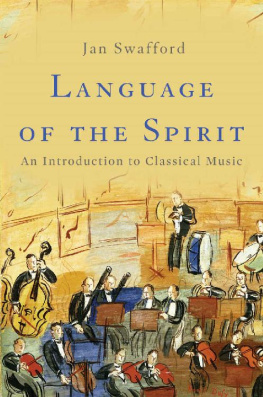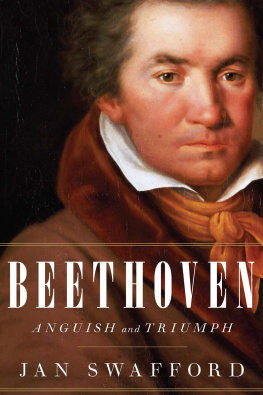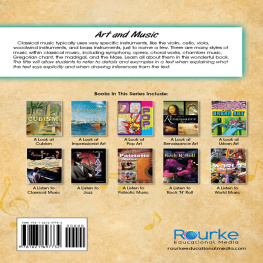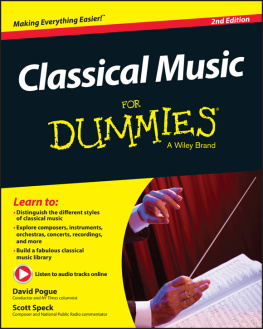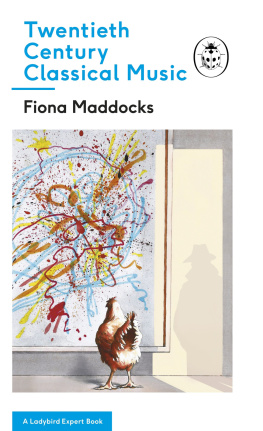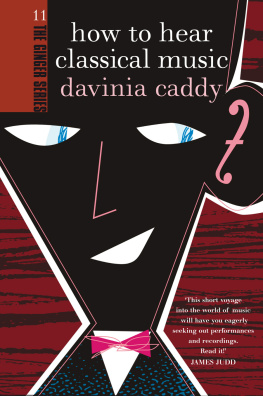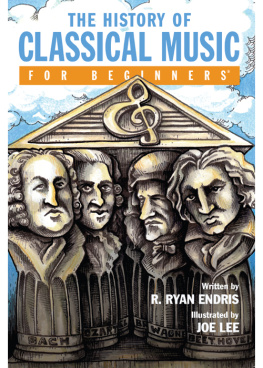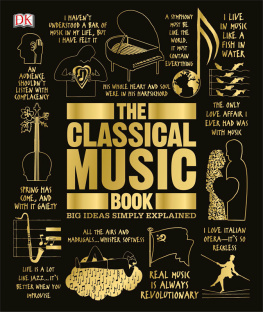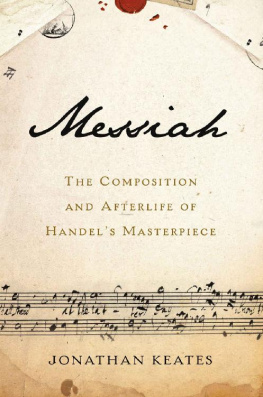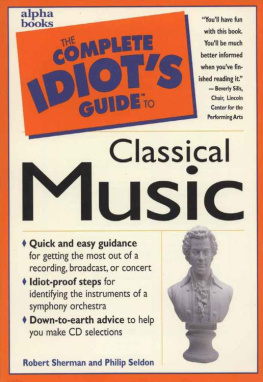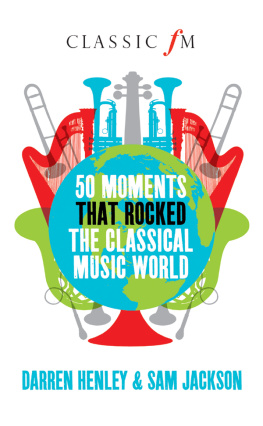Published in the United States by Basic Books, an imprint of Perseus Books, LLC, a subsidiary of Hachette Book Group, Inc.
All rights reserved. Printed in the United States of America. No part of this book may be reproduced in any manner whatsoever without written permission except in the case of brief quotations embodied in critical articles and reviews. For information, address Basic Books, 1290 Avenue of the Americas, New York, NY 10104.
Books published by Basic Books are available at special discounts for bulk purchases in the United States by corporations, institutions, and other organizations. For more information, please contact the Special Markets Department at Perseus Books, 2300 Chestnut Street, Suite 200, Philadelphia, PA 19103, or call (800) 810-4145, ext. 5000, or e-mail special.markets@perseusbooks.com.
Names: Swafford, Jan.
Title: Language of the spirit : an introduction to classical music / Jan Swafford.
Description: New York : Basic Books, [2017] | Includes bibliographical references and index.
Identifiers: LCCN 2016036556 (print) | LCCN 2016037002 (ebook) | ISBN 9780465097548 (hardcover) | ISBN 9780465097555 (ebook)
Subjects: LCSH: Music appreciation.
T his book proposes to do a number of things at once. It is an introduction to what we call classical music and its major figures, forces, and periods. It is intended to be a stimulus toward a better understanding of the music and the people who write and play it; a basic reference for facts and trends; a compendium of small biographies of important composers; and an examination of the presence of universal qualities in music: love, hope, exaltation, pain, and on through the catalog of qualities we experience and expect to be reflected in our art. After all, one of the prime functions of any art is to show ourselves to ourselves in moving and memorable ways.
Unlike my musical biographies, there are no footnotesthis is not a scholarly work. It is founded mainly on a particular motivation, which is the reason I got into classical music in the first place and the reason Im still at it as a composer and writer: pleasure and emotion. As a teenager I took up this music because it excited me, made me feel more than any other kind of music, more than most other things in my life. It still does.
I got to age twelve in the 1950s listening to Elvis et al., like every other kid. Then I took up playing trombone in the school band and turned out to be good at it, which made music a more or less daily endeavor. Before long I was trying to compose, because listening to classical music gave me an almost painful yearning in the pit of my stomach that was assuaged only when I started writing it myself. In the process I lost interest in being like every other kid. I began to find that a lot of pop tunes I thought I liked got boring after a few listenings, while many classical pieces seemed to open endless vistas of sensation and mystery. So, this book is also a love song to the art I love and to which I have devoted my life. After that, for me, is the fascination of how music is made, in so many times and places. That fascination will be fundamental here, too: how sounds are organized by ear and by rule, how instruments inflect music, how forms shape it, how emotions are portrayed, and so on.
From the books occasional forays into musical technique I hope the reader will leave with a basic understanding of the mechanics of music, because these play into the artistry. Overall, the book forms a brisk narrative history of the music, providing an introduction for novices and a reference for the familiar repertoire. It will work best when you listen along with the reading. Essentially every work I mention can be found on Spotify or a comparable online music service; the few that arent there are usually on YouTube (with its generally mediocre fidelity and sometimes scraggly performances). Somebody once said that writing words about music is like dancing about architecture. I think thats about half right, but the words here will at least make better sense when related to the sounds.
There will be a certain irony hanging around these pages, because I look at music with a tincture of irony, likewise the whole of human life and the great globe itself. As a writer on music Ive sometimes been accused of irreverence, which I admit, and add that my larger reverence is deep and plainly in view. I believe in genius and greatness, though like love and compassion and God, those are elusive and indefinable qualities. But music is made by and for human beings, and a certain amount of human life appears to me, to put it generously, nuts. Nobody, including great geniuses, is immune to that. To mention a few examples: Isaac Newton, who founded modern science, spent much of his life involved in alchemy. Franz Schubert, one the greatest born talents in music, spent much of his short life writing operas, the one medium he wasnt all that good at. Ludwig van Beethoven, who was reliably brilliant at every aspect of music, including playing and selling it, said accurately of himself: Outside music everything I do is badly done and stupid.
As you can see, the book will be personal to a degree, but I wont be wallowing in my own presumed wisdom. Ive taught music for some thirty-seven years, to students from eleven-year-olds to conservatory grads, and this book is intended to educate. My music biographies come from years of research and thinking; this book comes from decades of teaching. Much of the wisdom here is common wisdom, both that of musicians and of audiences over centuries. I have a certain respect for common wisdom; it never goes far enough, but often its common for good reason. Likewise, with a given composer most of the pieces I suggest you start with are familiar ones to the initiated. Beethovens Fifth Symphony may be all too familiar in some respects, but there are reasons its been loved for a long time. (Besides, as Ill get to, in its day the Fifth was one of the oddest pieces ever written.)
You may find sins of omission or commission here: How could you have left out [ ]! Nothing to be done about that. I will say that the recommended composers and pieces do not predictably have to do with my own enthusiasms. I cant say Im crazy about every one of them (some I used to be crazy about but no more), but theres no piece mentioned in this book that I dont respect. You wont be crazy about them all, either. When I was young I made a point of never disliking anything, but that happy and hippie all-embracingness is long gone. Still, if Im a bit of a snob it doesnt mean you have to be. I advise you to take in all new composers and works with absolute openness, and wait for your own taste to form as you get deeper into the territory. If something new surprises or shocks or perplexes you, I suggest going back to it. Some of those pieces will turn out to be favorites; some will upgrade your sense of what music is about; some may upgrade your sense of what you are about.
So while here and there Ill present a perhaps offbeat work and composer and point of view, most of the music will be from what we, with a sigh, call the standard repertoire, because many of those pieces are beloved for good reason. Its the word standard that rankles, because it doesnt evoke the excitement in these pieces that was manifest when they were new. A lot of todays standard was yesterdays revolutionary. At the same time, there is a body of works and composers out there who are lesser known but wonderful, and Ill dip into those. As one example, for years Ive played for friends the final chorus of the oratorio

